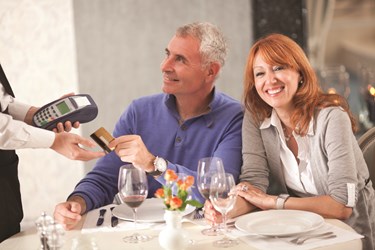Restaurant And Hospitality IT News For VARs — July 2, 2014

By Christine Kern, contributing writer

A new report shows that distributed-denial-of-service (DDoS) attacks rose in Q1 of 2014. Also, table turnover can be increased by up to 10 minutes per table using a new checkout app. A new display technology is also driving up average checks for Sonic, and technology can have an important impact on customer loyalty.
DDoS Attacks Increase In Q1 2014
According to a “State of the Internet” report, Akamai Technologies, Inc. has found DDoS attacks increased 36 percent in the first quarter of 2014 from the same period in 2013, but declined 18 percent from the fourth quarter of 2013. The survey reports 228 DDoS attacks in the first quarter of 2014: 27 percent targeted clients in the commerce industry, 28 percent in the private sector, 20 percent in the public sector, 16 percent in the media and entertainment sector, an 9 percent in the high tech sector.
Performance Data Shows Checkout App Increases Table Turnover
FSR Magazine reports that MyCheck, a checkout app for restaurants and other businesses across four major markets worldwide, released data last month regarding table turnover rates and average tips received. According to the data, MyCheck has integrated with over 3,000 merchants and has increased table turnover by an average of three to 10 minutes per table, leading to an extra two hours and 24 minutes of service per day. The data also revealed that MyCheck users on average typically tip 15 to 20 percent higher while a survey conducted of platform users showed 94 percent consider “waiting for the check” to be the most inconvenient time of a dining experience.
Future Bleak For Restaurant POS Terminals
This article from QSR takes a look at the future of POS terminals in restaurants, and concludes that they will not be around much longer. Half of consumers indicate that they would prefer a self-service experience to a full-service one. It is clear that consumers are demanding self-service options, which can offer a much better experience — much faster, more accurate, and ultimately more personal than ordering from a cashier who has to re-enter a spoken order into a POS system.
The Impact Of Tech On Hotel, Travel Customer Loyalty
This article by Chaotic Moon Designs examines the impact of technology on customer loyalty and how mobile technology can help raise a company’s standard of service. It suggests that mobile tech can improve the flying experience, in the air and on the ground; that to earn millennials’ loyalty, hoteliers will have to offer something meaningful; and that self-service machines dominate supermarkets and airplane terminals, so make sense for hotel lobbies as well; and finally why better mobile experiences are key to last-minute bookings.
Hospitality IT Talking Points
According to QSR, an extensive technology rollout for Sonic Drive-In includes a new POS system, as well as what it’s calling a new “point of personalized” (POP) service feature. Located in customers’ drive-in stalls, the POP systems include a digital drive-in menu board with a screen that plays dynamic content. During the initial tests, Sonic realized the functionality is two-fold: It offers suggestive selling opportunities to customers watching the content and, once their orders are confirmed, it can suggest add-ons.
For more news and insights, visit BSMinfo’s Hospitality Tech Center.
